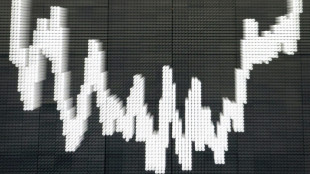

Asian markets tepid with eyes on China, US midterms
Asian stocks made a positive start on Wednesday following gains on Wall Street, but lost momentum as factory gate prices in China fell for the first time in nearly two years.
Shares in Tokyo, Hong Kong and Shanghai edged up at the open as votes were counted in crucial US midterm elections that will shape the political fortunes of President Joe Biden.
But they soon fell after official data from China showed the world's second-largest economy languishing under its strict zero-Covid policy.
Markets had climbed in New York and Europe on Tuesday, with Biden's Democrats facing a struggle to hang on to control of Congress, and polls predicting a Republican victory that could pave the way for a White House comeback bid by Donald Trump.
But that predicted Republican wave failed to materialise in elections fought against a backdrop of stubbornly high inflation.
By Wednesday afternoon in Asia, all eyes were on a handful of Senate races including in Georgia, Pennsylvania, Nevada, Arizona and Wisconsin, with a single seat enough to swing control of the Senate.
Market players were also awaiting key US inflation data due Thursday, causing the dollar to retreat along with the midterms as investors' risk appetite increases, analysts said.
Tokyo closed down 0.6 percent and Shanghai ended 0.5 percent lower, while Hong Kong stocks lost nearly two percent in afternoon trade after a recent run of rallies.
- 'No good news from China' -
Other Asian markets were mostly higher, with Taipei jumping 2.2 percent, Seoul gaining 1.1 percent and Singapore up 0.5 percent.
Sydney rose 0.6 percent and Bangkok lost 0.4 percent, while Jakarta was flat.
Speculation over how long Beijing will keep its harsh lockdown-and-testing Covid policies has fuelled volatility in Chinese markets, despite the government vowing it will not change course.
The restrictions have taken a toll on the economy. China's producer price index (PPI) fell by 1.3 percent on-year in October, pushing it into negative territory for the first time since December 2020.
The consumer price index (CPI) -- the main gauge for retail inflation -- rose by 2.1 percent on-year in October, moderating slightly from September's two-year high of 2.8 percent.
"The economy's slowing is confirmed by the CPI data," Iris Pang, chief economist for Greater China at ING Wholesale Banking, told AFP. "I don't see any good news from China."
Stephen Innes of SPI Asset Management agreed that the Chinese data painted "a rather gloomy picture, with PPI remaining deflationary and CPI much weaker than expected, pointing to waning demand".
Oil prices were driven lower during the day, but recovered in the afternoon.
"Rolling lockdowns in China, as Covid cases rebound, are catching oil traders leaning the wrong way," Innes said.
- Key figures around 0700 GMT -
Tokyo - Nikkei 225: DOWN 0.6 percent at 27,716.43 (close)
Hong Kong - Hang Seng Index: DOWN 1.9 percent at 16,244.91
Shanghai - Composite: DOWN 0.5 percent at 3,048.17 (close)
Pound/dollar: UP at $1.1541 from $1.1468 on Tuesday
Euro/dollar: UP at $1.0065 from $1.0005
Dollar/yen: DOWN at 145.66 yen from 146.26 yen
Euro/pound: DOWN at 87.20 pence from 87.23 pence
West Texas Intermediate: DOWN 0.1 percent at $88.82 per barrel
Brent North Sea crude: FLAT at $95.40 per barrel
New York - Dow: UP 1.0 percent at 33,160.83 (close)
London - FTSE 100: UP 0.1 percent at 7,306.14 (close)
F.Koch--MP



